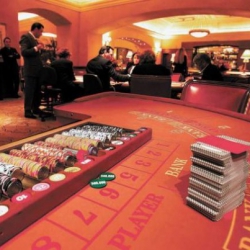
Baccarat Winnings Have Boosted Nevada Gaming Revenues in Recent Months, Due to Asian High Rollers
The American Gaming Association released a study using 2013 data which analyzed the gaming revenues across the United States. The study found that Nevada unsurprisingly led the nation in gambling revenues, but Pennsylvania quite surprisingly led in tax revenues collected.
One would imagine that these two statistics would be somewhat parallel to one another. Not at all. The state of Pennsylvania collected $1.43 billion in tax revenues, while Nevada collected only $900 million in taxes on the casinos. The tax rate is therefore significantly higher on the casino gaming venues in the Keystone State, which has the second-highest gaming revenues of all states which allow gaming.
Indirect Tax Revenue
Of course, the indirect tax revenues the state of Nevada receives from the casino gambling industry is much greater than any other U.S. state. Nevada’s casino paid $7.7 billion in wages in 2013, compared to just $831 million by the second-place finisher, Mississippi.
New Jersey casinos paid $774.6 million to their employees, which ranked third. Louisiana ranked 4th with $602.6 million in paid wages, while Pennsylvania finished fifth with $587.5 million. Combine the top ten other states and their casino industry did not pay as much in wages as Nevada.
Consider that the 169,908 Nevada residents who received those wages also pay taxes, including a state income tax, and you’ll understand that the casino industry does supply the state of Nevada with a huge tax windfall every year.
New Jersey casinos employed the second-most people with 32,427 workers, while Mississippi was third with 22,770. Louisiana had the fourth-most employees with 15,706, while Indiana finished 5th with 12,537 casino workers.
Mississippi Pays Better Than New Jersey
Another oddity that the AGA research pointed out was the disparity in wages between New Jersey and Mississippi. It is common to assume the cost of living is much higher in the American northeast, in proximity major metropolitan areas like New York City and Philadelphia. It is also common to assume a state like Mississippi is a depressed area, with a much lower cost of living.
In many ways, that is true of Mississippi. Yet the casinos in Tunica County and along the Gulf Coast of Mississippi pay much better wages than the Atlantic City casinos. Despite having 10,000 fewer workers in the Mississippi casino industry, the state’s gaming businesses paid $56.4 million more than their counterparts in New Jersey. Any way you look at it, the casino workers of Mississippi have a better standard of living than New Jersey casino workers.
US Gambling Industry Data
All total, the American land-based gambling industry employed 339,770 people in 2013. The casinos paid $13.44 billion in wages and $8.67 billion in tax revenues. That represents a significant contribution to the economy of the United States. Underscoring the revenues generated and the jobs created is one of the reasons the American Gambling Association wanted those numbers released.
The past 25 years of U.S. gambling history will show how much an industry can change in one generation. In 1989, Atlantic City was doing well enough that its leaders could boast they would one day overtake Las Vegas. At the time, Pennsylvania had no gambling of any sort. Now, Pennsylvania is the closest gaming rival to Las Vegas (though without the pretensions) , while New Jersey’s leaders are struggling to find a way to save the Atlantic City casino industry at all.
Chinese Gaming Revenues
Macau is an even starker example. Ten years ago, Macau was a backwater as far as gaming enclaves went, a former Portuguese colony struggling to find its place on mainland China. The city’s infrastructure could not sustain a Vegas-style gaming industry, and it was hard to reach the city by plane. A decade later, it is the most profitable gambling destination the world has ever seen.
Compare even Las Vegas’ revenues and the numbers are still far less than the yearly revenues generated by the gambling enclave in Chinese Macau. In 2013, casinos in the city of Macau generated $45 billion in revenues, though figures on tax revenues for the Chinese state are not available. It is estimated that Macau generates 7 times the revenue that Las Vegas does in a year’s time. That number might increase, though the slowdown of the Chinese economy might affect the predictions of still-further growth. One analyst for CLSA suggested that Macau’s revenues would top $77 billion by the year 2017.
